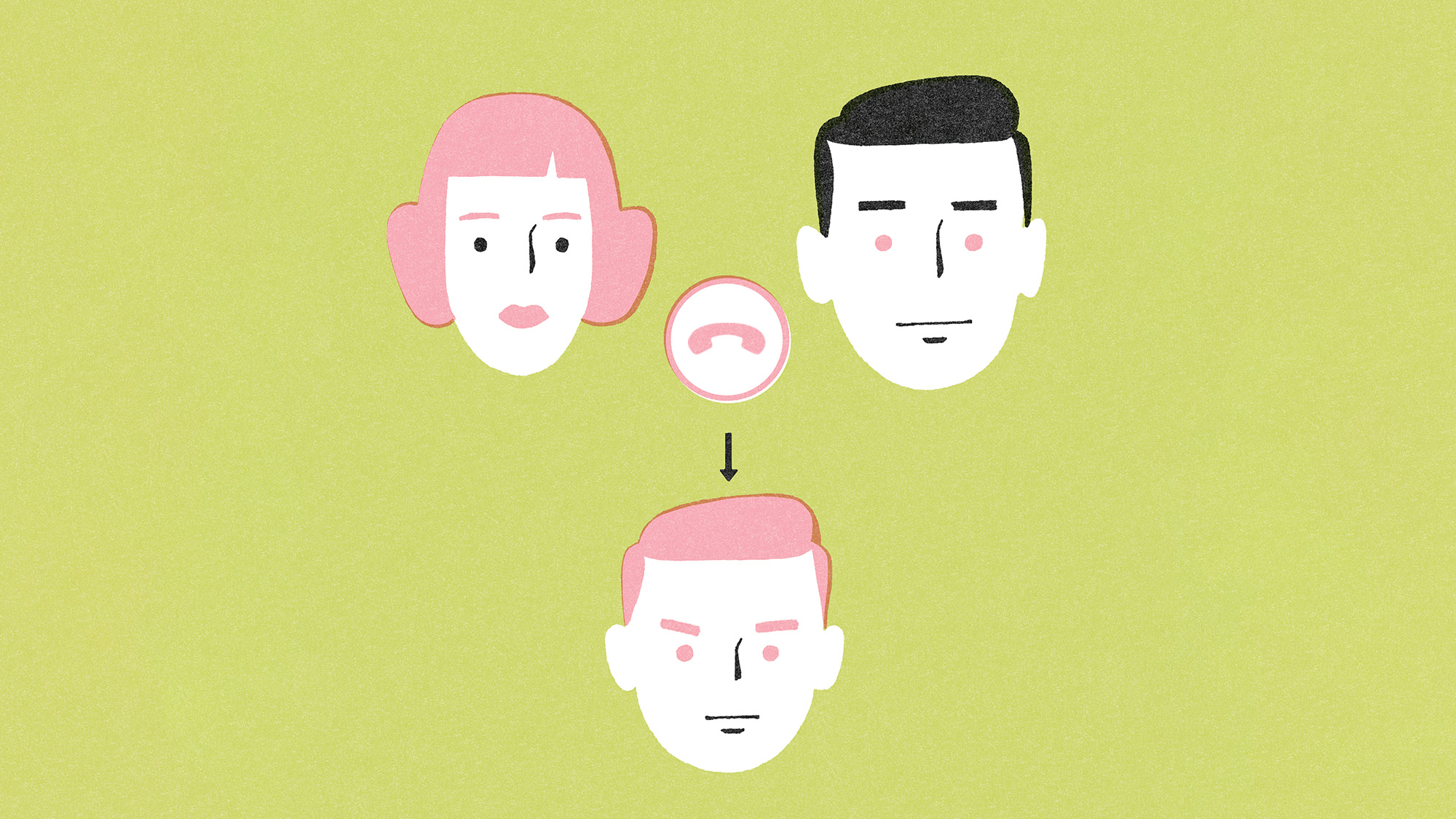'No contact': Why family estrangement is on the rise for young people
Young adults are quicker to cut off toxic family members to choose peace

Justin Klawans, The Week US

A free daily email with the biggest news stories of the day – and the best features from TheWeek.com
You are now subscribed
Your newsletter sign-up was successful
Younger generations are becoming more proactive in protecting their peace by estranging themselves from family members whom they consider to be toxic. Viral social media videos and recent op-eds point to the pervasiveness of the trend, as many young people choose to share their path of separation from relatives, a process known as going "no contact."
What does it mean to go 'no contact'?
Family estrangement, where "family members become strangers to one another like intimacy reversed," is still considered "somewhat taboo," said The New Yorker. But in recent years, "advocates for the estranged have begun a concerted effort to normalize it." They believe eliminating the stigma would allow "more people to get out of unhealthy family relationships without shame." While there is "relatively little data on the subject," some psychologists point to "anecdotal evidence that an increasing number of young people are cutting out their parents." Other experts think we are "simply becoming more transparent about it."
Interest in family estrangement is "still in its infancy," said The New Yorker. "The cliché 'hiding in plain sight' is really appropriate here," family sociologist Karl Pillemer said to the outlet. In a survey he conducted in 2019, Pillemer found 27% of Americans were estranged from a relative. Another study found that on average, people first became estranged from family members when in their 20s.
The Week
Escape your echo chamber. Get the facts behind the news, plus analysis from multiple perspectives.

Sign up for The Week's Free Newsletters
From our morning news briefing to a weekly Good News Newsletter, get the best of The Week delivered directly to your inbox.
From our morning news briefing to a weekly Good News Newsletter, get the best of The Week delivered directly to your inbox.
Recently, discussion about the topic has "just exploded," said Yasmin Kerkez, the co-founder of Family Support Resources, a group for helping people dealing with estrangement and other family issues, to The New Yorker. Several new organizations have popped up to raise awareness and provide resources for people who have gone "no contact" or "low contact" with family members. Society promotes the message that it is "good for people to have a family at all costs," when it could be healthier for people to "have a life beyond their family relationships and find a new sense of family with friends or peer groups," Becca Bland, the founder of nonprofit estrangement group Stand Alone, said to the outlet.
Why is estrangement on the rise?
Part of the reason estrangement has become more common is the "changing notions of what constitutes harmful, abusive, traumatizing or neglectful behavior," said Joshua Coleman, a clinical psychologist and the author of "Rules of Estrangement: Why Adult Children Cut Ties and How to Heal the Conflict," in his book. Coleman cited research that showed how the definition of trauma has expanded in the past three decades to include experiences once considered harmless. "The bar for qualifying as a trauma today is much lower," he said.
Many people have trouble ultimately making this decision, because most cultures look down upon the choice to "just cut ties with your family," said Wondermind, a mental fitness startup begun by Selena Gomez. But there are times when doing this is "necessary to protect your peace." The concept comes down to a "person saying, 'This relationship has become so unmanageable for me, and staying in contact is no longer an option,'" psychotherapist Whitney Goodman said to the outlet.
As for why people are estranged, an obvious culprit might seem to be political differences — but in reality, few people who've gone "no contact" actually cite this as their reason. Among those who are estranged from a relative, the main reason given is something the relative said or did, according to a Harris Poll released shortly after last year's election. Only one in five people attribute the split directly to political differences. That does not mean that reconciliation is entirely off the table, either: Of the group estranged due to politics, 39% said they at least somewhat agree that family members should do everything possible to reconnect.
A free daily email with the biggest news stories of the day – and the best features from TheWeek.com
Ultimately, there are several main reasons why someone should make the choice to go "no contact," said Wondermind. Almost all experts agree that "going no contact with someone who is consistently causing harm — whether it's verbal abuse, emotional abuse, manipulation or other cruel treatment — might be your best option to stay safe."
If reunification is the goal, Coleman recommends communicating expectations and a timeline to the other party. Estranged adult children should "let their parents know the changes that they need or want them to make" and that they will "check back in with them in six months or some period of time," he said to Very Well Mind. Pillemer, who is also the author of "Fault Lines: Fractured Families and How to Mend Them," suggests that you find a non-invasive way to communicate that you are open to reconciling. "Avoid anything that looks like stalking, but demonstrate your openness," he said to Vox. Communicating through a card, letter or a neutral third party could help set the stage for an eventual reconnection.
Theara Coleman has worked as a staff writer at The Week since September 2022. She frequently writes about technology, education, literature and general news. She was previously a contributing writer and assistant editor at Honeysuckle Magazine, where she covered racial politics and cannabis industry news.
-
 Bad Bunny’s Super Bowl: A win for unity
Bad Bunny’s Super Bowl: A win for unityFeature The global superstar's halftime show was a celebration for everyone to enjoy
-
 Book reviews: ‘Bonfire of the Murdochs’ and ‘The Typewriter and the Guillotine’
Book reviews: ‘Bonfire of the Murdochs’ and ‘The Typewriter and the Guillotine’Feature New insights into the Murdoch family’s turmoil and a renowned journalist’s time in pre-World War II Paris
-
 Witkoff and Kushner tackle Ukraine, Iran in Geneva
Witkoff and Kushner tackle Ukraine, Iran in GenevaSpeed Read Steve Witkoff and Jared Kushner held negotiations aimed at securing a nuclear deal with Iran and an end to Russia’s war in Ukraine
-
 Quiet divorce is sneaking up on older couples
Quiet divorce is sneaking up on older couplesThe explainer Checking out; not blowing up
-
 Admin night: the TikTok trend turning paperwork into a party
Admin night: the TikTok trend turning paperwork into a partyThe Explainer Grab your friends and make a night of tackling the most boring tasks
-
 Should parents stop tracking their kids?
Should parents stop tracking their kids?Talking Point Experts warn the line between care and control is getting murkier – and could have consequences
-
 Is convenience culture killing community?
Is convenience culture killing community?In The Spotlight A decline in emotional intelligence could be responsible for a diminished sense of belonging
-
 More than a zipper: Young Black men embrace the ‘quarter-zip movement’
More than a zipper: Young Black men embrace the ‘quarter-zip movement’The Explainer More than a zipper: Young Black men embrace the ‘quarter-zip movement‘
-
 How AI chatbots are ending marriages
How AI chatbots are ending marriagesUnder The Radar When one partner forms an intimate bond with AI it can all end in tears
-
 Broadway actors and musicians are on the brink of a strike
Broadway actors and musicians are on the brink of a strikeThe explainer The show, it turns out, may not go on
-
 Trouble on the seas as cruise ship crime rates rise
Trouble on the seas as cruise ship crime rates riseThe Explainer Crimes on ships reached nearly a two-year high in 2025
